A fascinating article on the political impact of Sputnik
Sputnik Stunned the World, and Its Rocket Scared the Pentagon
A fascinating article on the political impact of Sputnik
Sputnik Stunned the World, and Its Rocket Scared the Pentagon
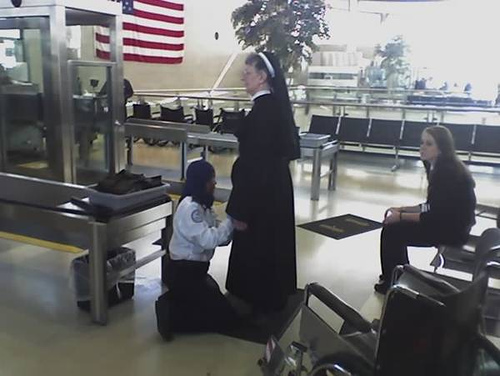
This morning I changed our Geico insurance from North to South Carolina. Previously, I’d been fairly pleased with Geico. We were paying just over $300 for six months’ coverage — more than reasonable, I thought. A great deal, in fact.
Moving to SC, however, would bring about higher rates. How much higher?
Geico’s quote was $690 — an increase of 122%!
“Time for insurance shopping,” I thought. First call — Nationwide. $440, or an increase of 41%. Still a significant increase, but certainly more reasonable.
Any suggestions for insurance companies that might offer better rates?
While wandering around Gatlinburg some weeks ago, I noticed several “Dixie-sympathetic” shirts. Confederate flags, Confederate war heroes — the works.
A few of the shirts I saw:
My personal favorite:

I only saw it in shop windows, never on someone. Which is a shame, because I would have loved to walk up to someone wearing it and request the history lesson.
In Poland, the Catholic Church is very much against Harry Potter — sort of like religious conservatives here.
Why?
We all know the standard reasons: wizards and sorcery are simply forbidden in the Bible. It’s that simple.
Yet K pointed out the “real” reason Potter worries the Polish church. I read the BBC News article opening to her:
The seventh and final Harry Potter book has broken sales records on both sides of the Atlantic, selling 11 million copies in its first 24 hours.
Harry Potter and the Deathly Hallows sold 2.7 million copies in the UK and 8.3 million in the US. (BBC)
She responded, “See, that’s why the Polish church is so scared of Harry Potter. That’s real power.”
My father used to joke when he traveled occasionally on business that US Airways’ name is missing a few letters to make it more accurate. I’m inclined to agree.
We took K’s mother, J, to the airport Thursday afternoon, leaving here at about 2:00 pm. She finally arrived in Poland Saturday at about 4:00 am, our time. And why?
Simple — US Air has both the competency and the professionalism of a wart.
Because of “heavy air traffic,” J’s flight from Charlotte left more than an hour late. K was with J at the gate, and K was asking what will happen if J misses the flight. US Air said that they would not take responsibility for the cost of getting J a hotel room in the eventuality that she missed her flight.
On the flight here, US Air lost both of J’s pieces of luggage. J landed in Chicago and then flew to Charlotte — but her luggage took a vacation somewhere else.
More accurately, the US Air representative could have said, “We don’t take responsibility for our customers. Period.” That was the reality of the situation, but we didn’t know that then.
K and I drive home, wondering if J got on board and whether everything was okay. Just as we were parking, the phone rings. It was J. She’d missed her flight and had no idea what to do. She was hysterical, literally. After all, it was almost twelve. The airport was virtually empty. There was no one at all from LOT, the Polish national carrier. As previously arranged, someone from US Air had led her to the next gate, but that was it. She was left stranded, not knowing what to do and unable to communicate with anyone. Finally, someone at the baggage claim area helped her get in touch with us, and all I heard from K was, “Mother, please calm down. Please. I can’t understand what you’re saying when you’re crying like that.”
Eventually, I got on the phone with US Air and had them re-book a ticket to Poland, but it was to be twenty-four hours after her originally scheduled departure time. Or at least that’s what the bloke at US Air told me.
Was there an offer at this point to arrange for a hotel for this poor woman stuck in the middle if an airport? No.
The difference between American flight crews and German flight crews.
While waiting for the first flight, K and J had the chance to observe several flight crews walking to their planes. Slowly, jackets unbuttoned, relaxed. In Germany, K watched a Lufthansa flight crew: everyone in perfectly pressed, buttoned uniforms, walking quick-step in a single-file line to their plane. “It was like they were in the army!” J laughed.
I spoke with Mark — the gentleman at baggage claim helping J — and he helped write a note for J explaining in English what her situation was so that she could go to the ticket counter when it opened and have her ticket reissued. He agreed to take care of her in the lost-baggage section, and even asked us what kind of coffee she preferred. If I were there, I’d have bought it a beer. Or a whole case.
We left it at that.
Friday, J spent the day in the airport. It turned out that Mark had taken the initiative to hunt down someone in the airport who could speak Polish, and this woman helped J through the rest of the day after Mark had left work. More — Mark had taken J to the ticket counter and helped her get her ticket reissued, and showed her where she’d have to go afterwards.
But it turned out that the ticket was not for a flight that left 11 pm Friday. It was for a flight that left 11 pm Saturday. So the guy who arranged the ticket for us, knowing that it’s for a woman who doesn’t speak English, arranged a flight 48 hours later and didn’t bother even to ask what this woman would do during said 48 hours.
Fortunately, the mystery Polish woman — also an employee of the airport — got better arrangements for J: a Lufthansa flight that left 30 hours earlier.
But that was just the beginning of J’s adventures.
Saturday morning, we learned that the Lufthansa flight was also late, and she missed her connecting flight in Frankfurt. But here German efficiency showed itself to be better than American “customer service.” Knowing that the flight would be late, Lufthansa had checked the passenger manifest, determined who would miss which flight, and re-booked those individuals. When J got off the plane, someone was waiting with a new ticket and guided her directly to the gate.
For those who might comment, “If that were me, letters would be written and calls would be made,” don’t worry — it’s in the works.
It seems to me that this how “civilized”carriers treat their customers. It seems to me that modern carriers will realize that, no matter what the cause of the delay, it is their responsibility to take care of passengers. It seems to me that passengers who arrange for special assistance — as we had done for J — should get that assistance as opposed to being dumped in the middle of an airport in the middle of the night. It seems to me that if a carrier wants to keep someone as a customer, it wouldn’t treat that customer to the same kind of service it provides said customer’s luggage.
And it seems to me that US Air’s price will have to be significantly lower than any other airline’s for me to consider using them.
 Returning to the story of our Gatlinburg adventure…
Returning to the story of our Gatlinburg adventure…
After we had some aquatic fun and the rain had stopped, K and I decided it was time to introduce J to the all American invention of mini-golf.
As when I taught Polish students how to play baseball, I was shocked at all the little nuances of a putting swing that I did without thinking — and I don’t golf, to speak of.
Rules of mini-golf, in other words.
For instance, never raise the club head above your knees — it will result in a swing instead of a put. This is almost always bad, but particularly so if there’s a rock in front of you and a young girl behind.
It’s entirely possible — however unlikely it seems — that the golf ball will strike the rock and sail back toward the young girl’s head. One would think that after this, said young girl would stay far away from axe-wielding grandmother, but youth has its own recklessness.
A few more pictures in the Gatlinburg photo set.
One of the problems of teaching to No Child Left Behind standards is the risk of teachers becoming nothing more than their students’ test scores.
Via Eduwonk.com I found one such teacher’s story:
I teach in an inner city school where inequity is apparent. The neighborhood has a high poverty level. Violence and poor housing conditions tuck my students in at night!
Underemployment, unemployment, lack of health insurance is the norm. It has only been of late that a “real” grocery store was available for residents to purchase fresh foods.
We are locked into teaching reading practices that are driven by federal government’s bad research. I witness a lack of all that made school a joy for my students. Literally the things that helped to build community and self-respect and self-esteem for children have disappeared. In their place is rigid schedules and long periods of disjointed phonics, and disjointed language practices.
One of the reasons many teachers are not fans of NCLB is that it’s a one-size-fits-all solution. That “one-size” is often, as this teacher comments, “disjointed.”
This teacher writes of her students’ lack of satisfactory achievement according to the NCLB-mandated state testing.
My Unsatisfactory “grade” was followed by the comment:”This teacher�s students made minimal growth in her classroom this year.”
Most of my children are reading on or above grade level. The amount of “progress/growth” made this year by most of my children was no where near minimal.
I asked my principal if she believed that statement that appeared on my evaluation. She said “Yes, I do, based on your DIBELS scores!”
Her statement hurt me because I know the amount of work I did this year with my precious students. The amount of growth the children had in all areas was in no way “minimal.” I mentioned that the reading levels of some of my first-graders were equal to the end of second grade. She said the district didn�t recognize non-standardized test scores. (susanohanian.org)
Having worked with at-risk kids, I can understand (to a degree) what this teacher is going through.
Such “teaching” turns both students and teachers into little more than cogs in some great bureaucratic machinery. No one is working toward “learning” in any real sense here, and as far as teaching critical thinking, it’s probably non-existent.
Very often, kids coming from such backgrounds need so much more than simple reading and writing instruction. They step into school with huge disadvantages to begin with, and to some degree, reading and writing alone will not help them. They need work with social skills and an understanding of the social framework that exists outside the inner city.
This is not to say that I am advocating a sixties-style “go where the students take us” type of teaching, and I am not suggesting that all standards are a bad thing. However, NCLB’s cookie-cutter approach seems to do little for many students and teachers.
After visiting the aquarium and walking around town a bit





we headed back to the hotel room for a bit of a break. And then the rain started.
That’s when we decided to make use of the accident of our booking — a room with a king-size bed (poor J slept on the most uncomfortable couch in history) with a jacuzzi in the room.

Naturally, with the Girl joining us, the water was not as not as it should have been, but that was offset by the joy of her splashing.
More at Flickr and YouTube (short video that includes a portion that has nothing to do with rain or a jacuzzi, but is amusing nonetheless).
After a little sightseeing in Chatt., we heading out for Pigeon Forge, where we’d be saying for the next two nights.
Our day in Gatlinburg began at the aquarium.

The initial impression — a little cheesy. Fake sky with fake birds and fake clouds painted about the main tank.
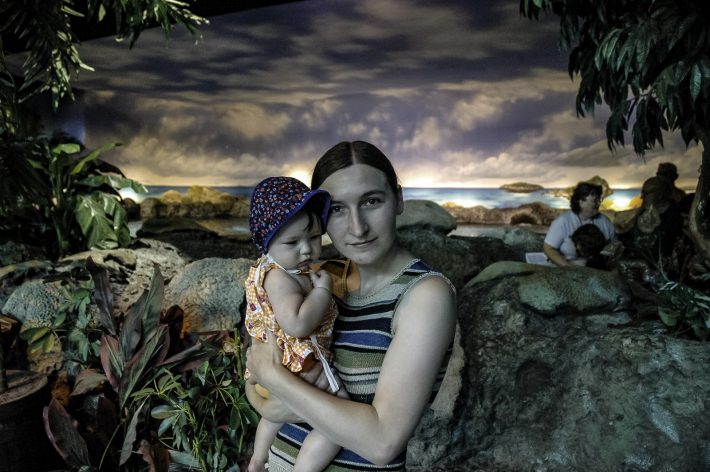
Then we went through the tunnel, and it all made sense…

The underwater tunnel was so enlightening that we decided to go through it a second time before leaving.

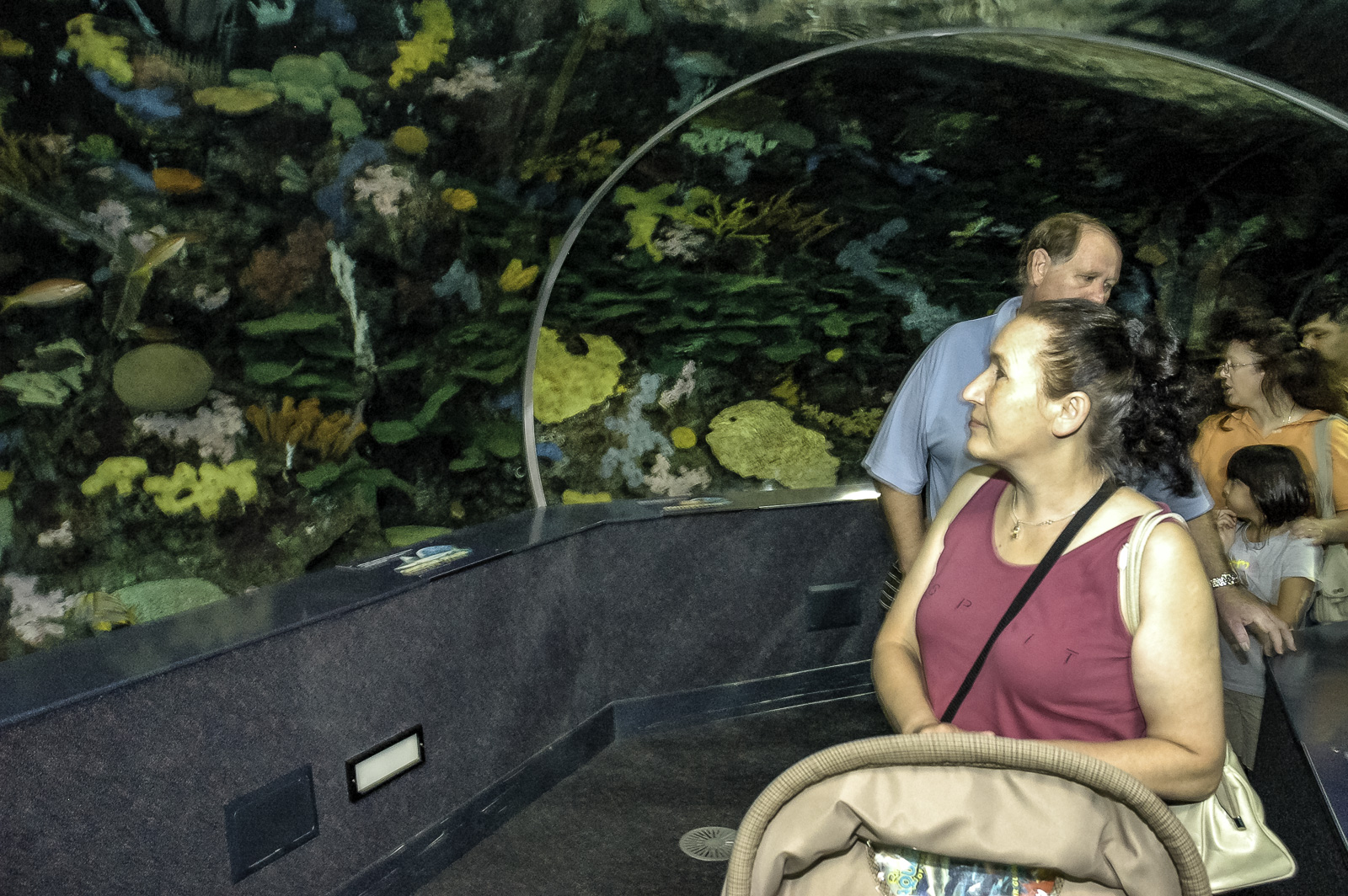




It was a lot of fun, but I found myself wishing L was about two or three years older, so that she could enjoy it more. As could be expected, there was a kids’ area where visitors could touch horseshoe crabs and crawl into amusing, picturesque fish tanks.
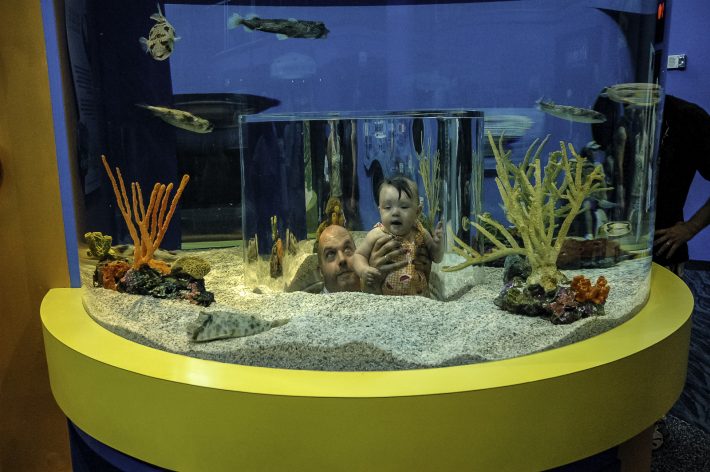
L couldn’t crawl, so I helped.
Still, it seemed she had a pretty good time — she slept, she ate, she saw a few new things. Overall, a success.
There are more pictures at Flickr. And of course there’s a film.
Soon, J will be flying back to Polska. K and I wanted to take her on some kind of semi-extended semi-vacation before she left, but where to go?
Our trip had several constraints from the beginning
So we did the logical thing: we went kitsch.
America is filled with kitsch, and the common view from Polska is that “Americans like kitsch.” There was only one place that fulfilled all our criteria: Gatlinburg.
But we knew that it would be relatively expensive to do much there, so we sandwiched it with a half-day in Chattanooga and a day in Cherokee.
Our stops in Chattanooga were about as kitsch as could be, in some ways: Rock City









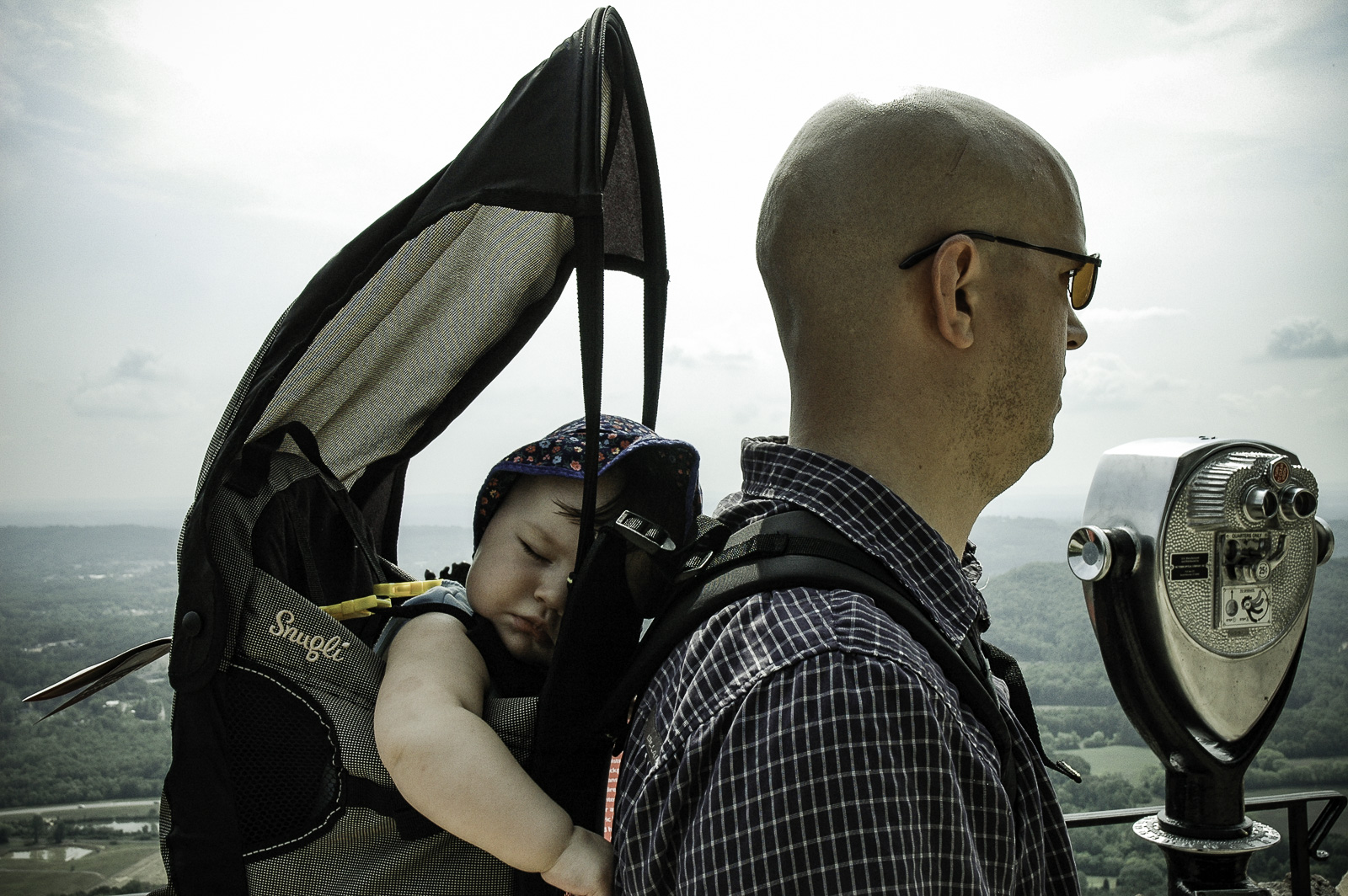




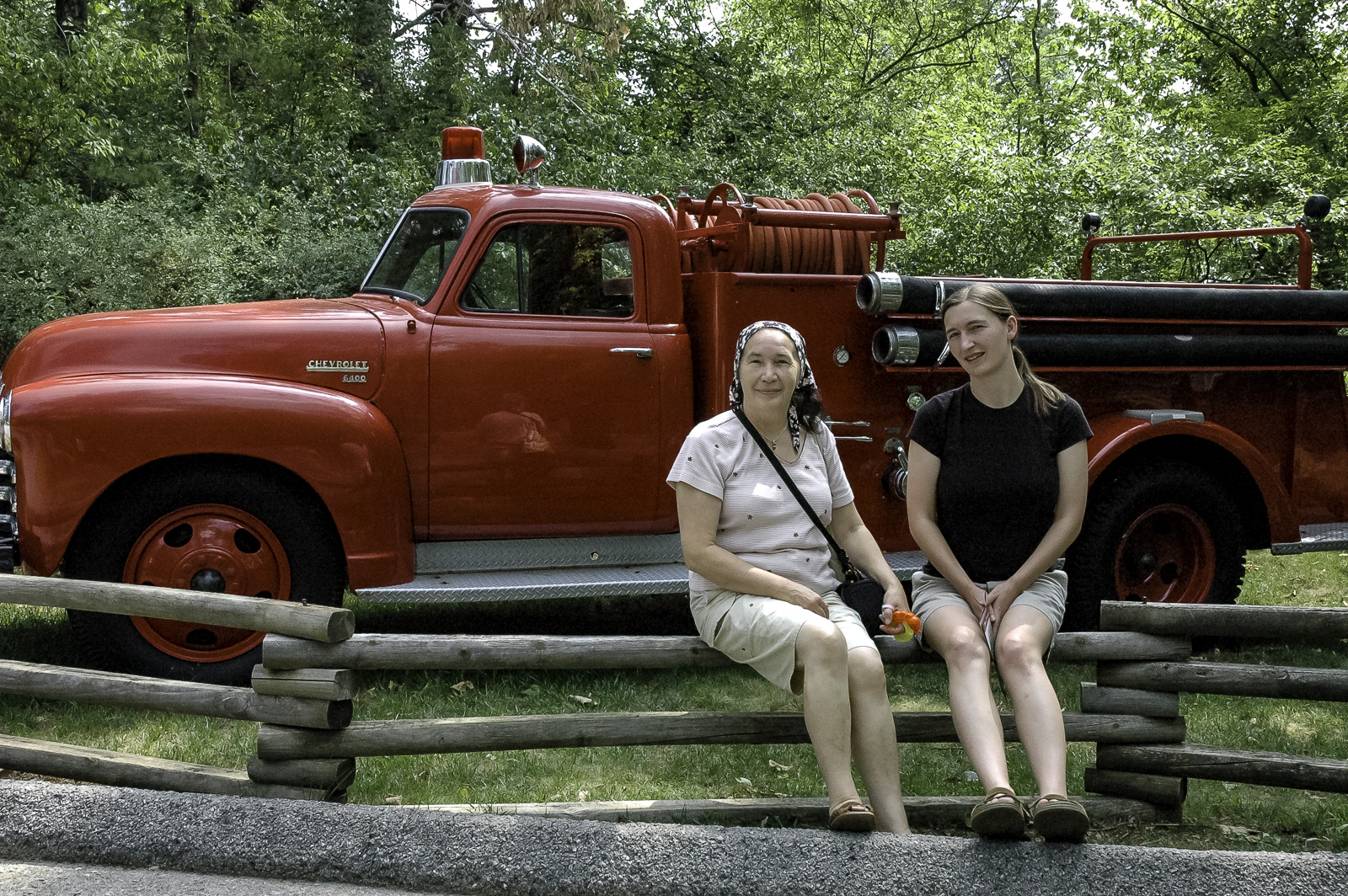

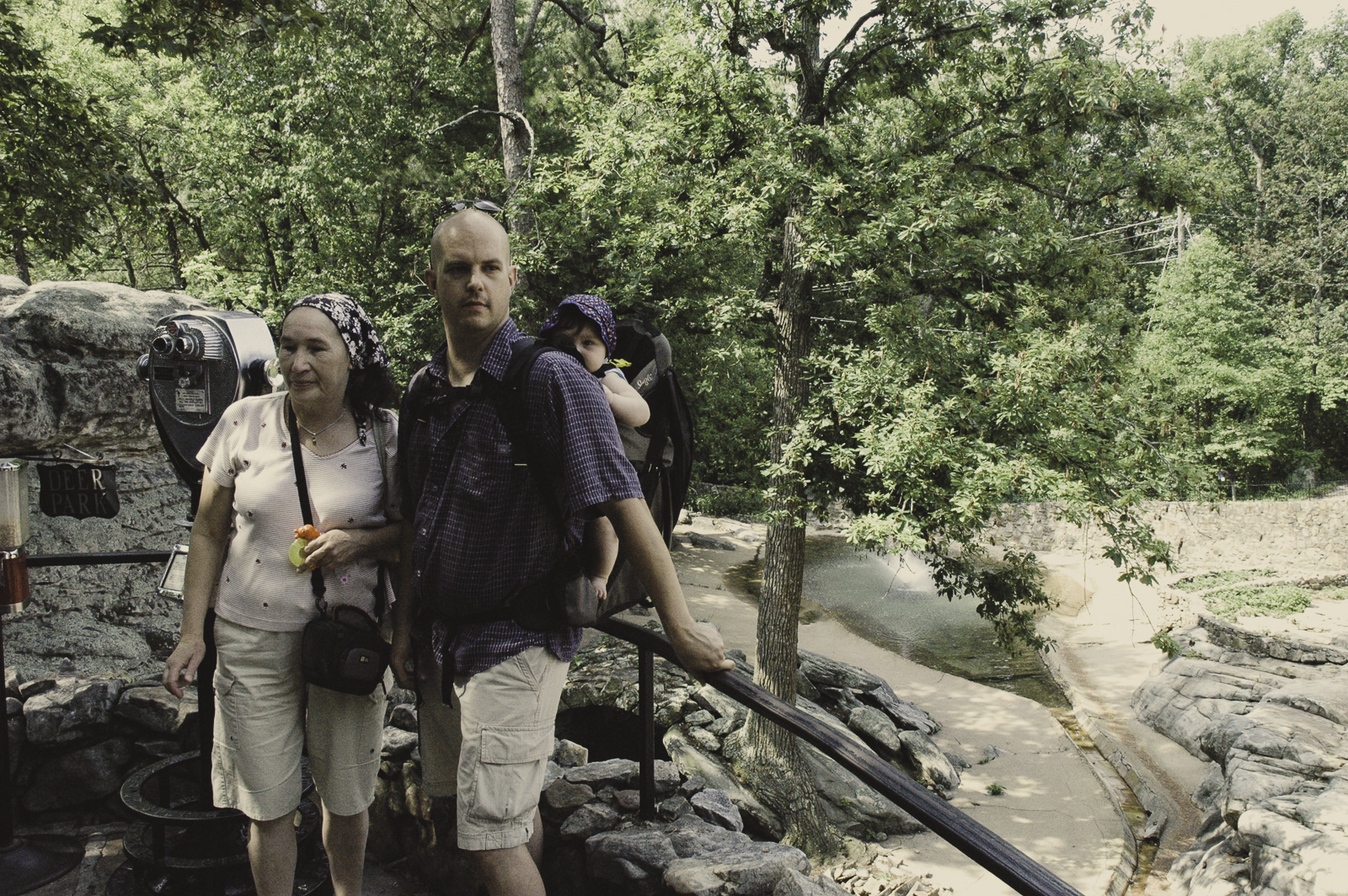
and Ruby Falls.





Very American: take nature, and improve it with sidewalks, elevators, and safety barriers. And above all, make it auto-accessible.
We had fun, though. Rock City brings out the little boy in everyone, and Ruby Falls, while overly theatrical (not to mention amazingly crowded in the summer), is a fairly impressive sight.
Photos of our adventure are available here.
For the last several months, I’ve been hearing more about the iPhone on NPR while driving to work than I really cared to.
The phenomenon is a fascinatingly, achingly-perfect example of our consumer culture. All of the reporting I heard on NPR was about the wonderous technology and gotta-get-it, gotta-get-it, gotta-get-it.
Or sometimes about people who feel they’ve gotta-get-it, gotta-get-it, gotta-get-it.
People standing in line; people paying people to stand in line. Lines, everywhere — if reports are to be believed. People waiting to buy; people waiting to try: to the former, “Do you have nothing better to do with your money?” and to the latter, “Do you have nothing better to do with your time?”
I really just don’t get it. It’s a phone that plays music, and accomplishes it without a keypad. Nothing revolutionary. Nothing that turns our conception of the universe on its head. Bohr, Plank, and Einstein would have all been impressed, I’m sure.
Perhaps I’m just one of those “old fashioned” types that thinks a phone that is just a phone is sufficient. My phone is two years old, and if I don’t have to get a new one to renew my contract, I probably won’t, because I just don’t care. It rings; I talk — end of story.
If I want to listen to music, I’ll use my iPod…
Ron Paul is Exhibit A in the case of why we need more than two viable political parties. Granted, there’s the Libertarian Party, and that was RP’s party of choice some years ago, but now he’s running for the Republican party nomination — even though most of the Republican party shuns him.
He does seem fairly un-Republican in some ways. His ideas about Iraq win him more applause from Bill Maher than any of the Democratic candidates.
If we think we can do what we want around the world and not incite hatred, then we have a problem. […] They don’t come here and attack us because we’re rich and we’re free. They attack us because we’re over there. (Republican candidate debate)
I don’t know of any Democratic candidate who’s talking about blowback and 9/11. It sounds like something out of a Chomsky book, as do his comments about the folly of spreading democracy with a gun.
And yet, Paul was talking to Cobert, he indicated that he’d be more than willing to have a small a government as possible, eliminating various agencies such as the Department of Education and the Department of Homeland Security.
What he is, in reality, is a real Republican — an isolationistic, small-government, states’-rights, federal-government-butt-out, old-fashioned Republican. The Republicans have strayed so far from their original principles that a “real” one stands out.
Via Kerim at Keywords, who found it at Strange Maps.

It is a bit misleading, though, as Strange Maps explains:
The creator of this map has had the interesting idea to break down that gigantic US GDP into the GDPs of individual states, and compare those to other countries� GDP. What follows, is this slightly misleading map � misleading, because the economies both of the US states and of the countries they are compared with are not weighted for their respective populations.
Pakistan, for example, has a GDP that�s slightly higher than Israel�s � but Pakistan has a population of about 170 million, while Israel is only 7 million people strong. The US states those economies are compared with (Arkansas and Oregon, respectively) are much closer to each other in population: 2,7 million and 3,4 million.
All the same, fascinating.
I went to Strange Maps myself (obviously) and found a map much more interesting, in my view: the Inglehart-Welzel Cultural Map of the World.
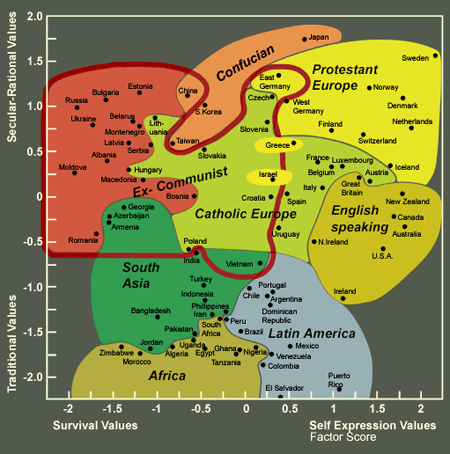
How to read the map?
On this map, East and West Germany are next to each other, as one would expect. But Romania�s closest neighbour is Armenia? And Poland and India are side by side? Well, this is not a straightforward geographical map, but a cultural one. It plots out how countries relate to each other on a double axis of values (ranging from �traditional� to �secular-rational� on the vertical and from �survival� to �self-expression� on the horizontal scale). This makes for some strange bedfellows � for example: South Africa, Peru and the Philippines occupy almost the same position, although they�re on three different continents.
If I were a social studies teacher…
When teaching English as a Foreign Language, I often wondered whether I would work in an educational setting that provided such clear evidence of progress. When you take a first year class that speaks no English and help turn it into a group of kids almost all of whom pass the English language exit exam with good marks, there’s a definite sense of achievement.
Then I spent seven months working with autistic children.
A couple of the students finished the year as completely different children than when they started. Gains in reading ability, social interaction, verbal expression, math skills, and general life skills left me simply astounded, and understandably proud that I had something to do with it. (Seven Months)
Now, working with at-risk kids, I get a third example.
A young man came up to me the other day to tell me something.
When he first arrived, he spoke to me only when he absolutely had to, he cussed me out on a fairly regular basis, and he never, in any circumstances, looked me in the eye. He had trouble getting along with other kids, and if you judged him just from that, you’d come away thinking he was a fairly unpleasant person.
This time, his eyes wide with a big smile, he said, “I done something good today, but you didn’t see it.” He then told me about how he’d managed to keep his temper under control with another kid in the program whom he finds irritating.
It was the first time I’d ever seen pride in his face.
How effective is No Child Left Behind? Not very.
In fact, it harms our kids instead of helping them. How?
Here’s a letter from a parent who’s also a teacher with 21 years’ experience which explains the problems perfectly: Letter about Re-Authorization of NCLB.
Bush went to visit Poland during the G8 summit. Yesterday in the car, I heard two different NPR news briefs about it — not whole reports, but simply a mention in the headlines.
Neither time did the reporter refer to the Polish president by name.
The first time was something about Bush going to Poland to visit “that country’s president.”
The second time, it was a mention of Bush meeting his “Polish counterpart.”
I’ve wondered why they didn’t use the Polish president’s name. Is the Bush’s Polish counterpart’s name so difficult to pronounce? Did the reporter not know the name of the president of Poland?
For the uninformed, it’s Lech Kaczenski. (That “n” should have an accent on it.) That would be pronounced “Ka-chenee-ski.”
Can they not pronounce it? Can they not remember it? At least they didn’t have to say “president of Poland” in Polish — that is a mouthful: “Prezydent Rzeczypospolitej Polskiej”